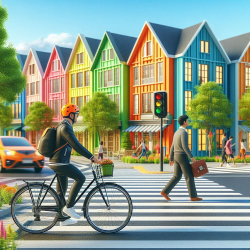Tuesday, May 13th, 2025
Safety of pedestrians and cyclists top the list
Focus on road safety

THIS week marks the 8th UN Global Road Safety Week (GRSW).
THE GRSW kicked off on Monday and runs until Sunday. The Western Cape Government said it was committed to the week. This year’s theme, #MakeWalkingSafe and #MakeCyclingSafe, focuses on ensuring the safety of pedestrians and cyclists on the roads.

Road traffic injuries are a leading cause of death and disability worldwide, with nearly 1.2 million people killed and as many as 50 million people injured each year. In the Western Cape pedestrians and cyclists are particularly vulnerable, making up more than half of all road traffic fatalities.
“Pedestrians and cyclists remain among the most vulnerable, and the number of drunk driving arrests is deeply troubling. Behind every incident is a real person – a parent, a child, a friend, neighbour or colleague. We urge all road users to slow down, stay alert, and take personal responsibility for making our roads safer for everyone,” said Muneera Allie, Western Cape Mobility head of communication.
The 8th UN Global Road Safety Week is a chance to inspire action of all road users to ensure walking and cycling are safe in the Western Cape.
Safety Tips for Pedestrians: Cross only at designated pedestrian crossings and bridges, avoid walking on highways and busy roads, wear visible or reflective clothing, especially at night or in poor weather conditions and stay alert – avoid distractions like phones or headphones near traffic.
Safety Tips for Cyclists: Use bike lanes where available, stay close to the left edge of the road, follow traffic signs and signals, ride with the flow of traffic, be visible, use front and rear lights when riding in the dark or when visibility is poor, signal with your hands when turning or changing lanes, watch out for road hazards and other road users, especially at intersections, always wear a properly fitting helmet and avoid using headphones while riding.
Tourists spend more than R61 billion in SA
Tourism a driver of jobs

Tourism continues to be a cornerstone of economic development across Africa, driving job creation and investment while showcasing the continent to the world.
Tourism Minister Patricia de Lille emphasized this during her address at Africa’s Travel Indaba 2025, currently taking place in Durban.

As South Africa welcomes millions of visitors annually, the government is working to ensure sustainable growth in the sector and expand its impact on employment and local economies, says De Lille.
She highlighted South Africa’s strong performance, noting that the country welcomed 8.9 million tourists in 2024, with their direct spending contributing R91.6 billion to the economy and supporting an estimated 1.6 million jobs.
“In the first quarter of 2025, South Africa welcomed close to 2.6 million tourists, reflecting a 5.7% growth compared to the same period in 2024,” de Lille said.
Africa’s tourism sector is showing remarkable resilience, with UN Tourism reporting a sharp rebound in 2024, reaching 96% of pre-pandemic levels and cementing Africa as one of the fastest-growing travel destinations.
At this year’s Indaba, over 1,300 exhibitors and delegates from 27 African countries have gathered, along with more than 1,200 vetted international buyers representing 55 markets worldwide. The Minister highlighted the importance of regional tourism, noting that 75% of South Africa’s international arrivals come from within Africa.
“The tourism economy of tomorrow is African. It is diverse, youthful, digital, and green. But we know that we cannot rest. We need to break through to a much higher rate of growth. We need a plan we can implement immediately,” de Lille said.
The Department of Tourism is finalizing a five-year Tourism Growth Partnership Plan aimed at increasing employment in the industry, growing domestic spending by 25%, raising tourism’s GDP contribution from 8.8% in 2024 to 10%, and attracting an additional one million international air arrivals annually.
With the G20 2nd Tourism Working Group meeting happening alongside the Indaba, African tourism is taking center stage in global discussions, reinforcing the continent’s role in shaping the future of travel. Source: SAnews.gov.za
